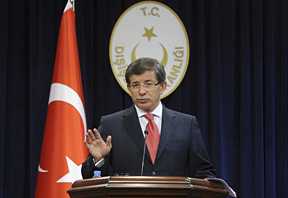12/12/2011
Despite reaching new lows in their relations, some question whether instability and changing dynamics in the Middle East could push Turkey and Israel to settle their differences.
By Alakbar Raufoglu for for Southeast European Times — 12/12/11

Turkey demands an apology from Israel, compensation for the families of the flotilla victims, and the removal of the Gaza blockade. [Reuters]
|
Yildirim Tugrul Turkes wonders what the Middle East would be like today if Israel and Turkey, two longtime allies in the region, hadn’t experienced the tragic May 2010 Mavi Marmara flotilla raid.
“It’s hard to see how our nations are about to lose their 50-year friendship in front of our eyes,” Turkes, an MP from the far-right Nationalist Movement Party (MHP), widely known as the son of the MHP’s founder Alparslan Turkes, told SETimes.
For many years, Israel and Turkey co-operated to deal with regional security challenges, brought together by their relationship with the United States and common threat perceptions towards Syria and Iran, instability in Lebanon, and terrorism.
However, over the past decade, Turkish security perceptions shifted in line with regional dynamics and the foundations upon which Turkish-Israeli relations were built in the 1990s began to unravel. Under Ankara’s much touted “zero-problems” neighbourhood policy, relations with Iran and Syria improved, driven by economic relations and common concerns over Kurdish nationalism.
Regional dynamics in Iran, Iraq, and Syria left Israel less important in Turkish security perceptions. If anything, from Ankara’s perspective, the inability of Israel to come to terms with the Palestinians was becoming a threat to regional peace and security.
However, the ongoing Arab Spring, especially the regime of Bashar al-Assad’s crackdown on demonstrators in his country, and rising tensions between Ankara and Tehran over Iran’s support for Syria, has again altered regional dynamics and security perceptions.
This has prompting some to question whether there is a chance to get Turkey-Israel relations out of their lowest point in the two countries’ history.
Like many in Israel, some Turkish politicians believe that to enhance regional stability, the two former allies must find a way to mend their relations.
“But how?” asks Turkes. “Israeli officials should think about that. I wish the Gaza incident, which caused the death of nine of our citizens, hadn’t happened at all.”
In the immediate aftermath of the details leaked from the UN report on the flotilla incident in September, Turkey reduced diplomatic ties, ended all military agreements, took steps to secure freedom of navigation in the Eastern Mediterranean, and announced it would support the flotilla victims in pursuing justice in international courts.
As a precondition for normalising relations, Turkey demands an apology from Israel, compensation for the families of the flotilla victims, and the removal of the Gaza blockade.
Echoing the sentiment of analysts and policy makers in Turkey, Turkes says Israel’s recent contribution of humanitarian aid to Turkey in response to the earthquake that hit Van in late October was “a very warm gesture”, but not enough to restore diplomatic relations.
Even so-called “football diplomacy” has failed, as neither Turkish nor Israeli officials participated in the December 1st football match between Besiktas and Maccabi Tel Aviv in Israel.
“We have nothing to talk about with the Israelis unless they accept their responsibility [for the flotilla incident],” Yahya Akman, MP from the ruling Justice and Development Party (AKP) who resigned from the Turkey-Israel Friendship Group a day after the Gaza incident, told SETimes.
“Our problem is not with the Israeli people; the problem is with the non-peaceful Israeli administration,” he adds, saying that relations could substantially improve if the Israeli side apologises for the flotilla incident.
However, International Crisis Group’s Turkey project Director Hugh Pope thinks there will be no real warmth in the relationship until Turkish public opinion is convinced that Israel is working whole-heartedly towards a settlement with the Palestinians.
“Turkey is very keen to normalise relations with Israel,” he told SETimes. “Such normalisation would clearly reduce tensions in the region, although perhaps it is not the top priority in the context of the Arab revolts, given that embassies are still open in both countries and basic contacts continue.”
For Caroline Glick, deputy managing editor of The Jerusalem Post, the countries can reconcile only if Turkey decides it is interested in reconciliation.
In Israel, she says, “We have already moved on from our relationship with Turkey and have built strong strategic ties with Greece, Cyprus and other states, to counterbalance Turkey’s increased belligerence and irresponsible behaviour.”
However, the two countries still share certain interests, she says, adding, “as a result, it is possible that we will see co-operation on specific issues where such co-operation serves the interests of both countries.”
“That co-operation, however, will not serve as a basis for rebuilding the former relations so long as Turkey remains committed to its current anti-Israel and anti-Western policies,” she said.
However, Israel’s budding relationship with Cyprus and Greece has only aggravated policy makers in Ankara, further pushing Turkey and Israel apart. To many analysts, Israel’s relationship with third tier states that are facing economic crisis and are geographically distant from Israeli security interests in the Middle East is no substitute for Turkey.
Alon Liel, former Israeli ambassador to Turkey, thinks that as long as Israel does not apologise for the Mavi Marmara casualties, official contact can only be at the intelligence level between the Mossad and the MIT.
“This contact now has a real chance to develop because of the Syrian civil war and its possible implications on both Israel and Turkey,” he told SETimes, arguing that if Turkish-Israeli relations were good, then Syria would approach its relations with Turkey differently today.
In Ankara, politicians are still wary of talking about possible Israel-Turkey co-operation at this stage and some believe the Arab uprisings and Israel’s increasing international isolation could prompt Israeli officials to accept Turkey’s conditions regarding the flotilla accident.
“The geopolitical changes might bring more difficulties to Israel’s interest, rather than Turkey,” says Sukru Elekdag, a veteran Turkish diplomat, explaining that the Arab uprisings may result in “a pool of Sunni regimes in the region, based on Sharia”.
“This situation doesn’t provide any hope to Turkey, which was seeking a modern democracy in the region. But for Israel, it creates a suffocating political atmosphere,” he adds.
Ali Balci, an analyst at the Sakarya University, agrees that unless Israel apologises for the Gaza flotilla, Turkey “will try to solve problems, such as the PKK, Syria and others by not relying on Israel”.
“For example, Turkey has worked together with the Arab League to solve the Syrian problem. It also gets help from American drones and the Iraqi government in fighting against the PKK,” he argues.
However, Balci adds, in the event that Israel accepts Turkey’s conditions, “this will not bring the two countries back to a security-oriented foreign policy as in the 1990s.”
“The honeymoon in the 1990s has already been history [for a while]. Israel should first accept this. A new rapprochement should grant that Turkey and Israel have joint interests to build on, but also differences to work out,” Balci notes.
Among the differences to work out, he says, is Israel’s “aggressive policy”, which is viewed by Turkey as one of the main reasons behind the region’s instability.
However, Nildag Gizem Hatayoglu, a researcher at the Ankara-based Centre for Middle Eastern Strategic Studies, argues that the problem between the two countries could be resolved if Islamism in Turkey, and nationalism in Israel, were not in power.
“I have lots of friends in Israel. We all agree that our nations can’t be enemies or easily give up on their friendship,” she told SETimes, adding that the people in both countries could overcome their difficulties, if they ignore official propaganda.
“People don’t know if there are any options to get together because the local media in both countries doesn’t talk about that, except spreading negative propaganda,” she says.
This content was commissioned for SETimes.com.





